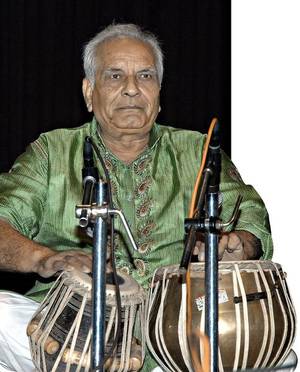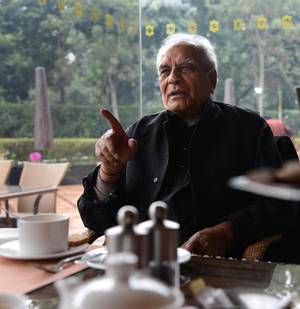Meerut, UTTAR PRADESH / Baroda, GUJARAT / NEW DELHI :

Tabla exponent Ustad Hashmat Ali Khan, passed away recently
The sudden demise of Ustad Hashmat Ali Khan, a renowned tabla exponent and a revered Guru of Ajrada Baaj, came as a shock to the music fraternity.Ajrada Baaj is one of the six main schools of tabla playing. Ajrada Gharana is known for or what is the specific ‘Nikas’ of the Bols in this style. The Aalap like Peshkar, the varied Quayedas of his Gharana, the Rela, Fard, Gat, Paran, where all three of them joined the demonstration together.
Many a times, Hashmat Ali Khan, would share his childhood memories of the Baroda Darbar, where his grandfather Ustad Shafi Khan was a ‘Mulazim’ as a musician like Aftab-e-Mausiqi Ustad Faiyaz Khan, the legendary vocalist of the Agra Gharana, Ustad Nisar Hussain Khan and Kanthe Maharaj. The ICCR had sent him to Gayana to teach the art of tabla and propagate Hindustani music there. He had joined the Bharatiya Kala Kendra, as a faculty member, way back in 1972. He remembered how Ustad Hafiz Ali Khan encouraged him to join this institution when Naina Devi interviewed him. As a thanks giving gesture, he used to go to his place after dinner, to make young Amjad (Ustad Amjad Ali Khan) practice sarod with his tabla Sangat.
Ustad Hashmat Ali Khan established the Tabla Academy of Ajrada Gharana in 2008 and trained a number of students including his own grandsons Zuheb, Zaheen and Zargham.
Remembering father
Ustad Akram Khan remembers him fondly. “We all had dinner and watched cricket together discussing the game. He was fond of cricket. He was so affectionate as a father but equally strict as a teacher. A strict disciplinarian, he would make us do regular riyaz at least for 4-5 hours a day. He took it upon himself to spread the Ajrada Baaj at home and abroad. He conceived the Peshkar and kayda, as a raga. As one does Badhat in raga sequentially (silsilewar) Rishabh, Gandhar, similarly in peshkar or kayda. Like in a raga, you cannot use swaras other than those prescribed for the raga.
“Unhone is Khazane ko baantne mein koi kanjoosi nahin barti”. He was not a miser in spreading the treasures of his Gharana. I only hope that the next generation takes benefit of all that he has bequeathed so generously!”
source: http://www.thehindu.com / The Hindu / Home> Features> Friday Review / by Manjari Sinha / May 26th, 2017









